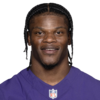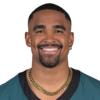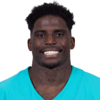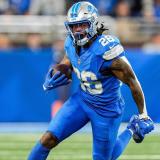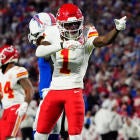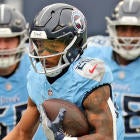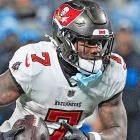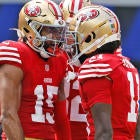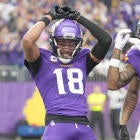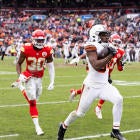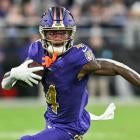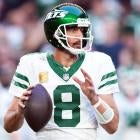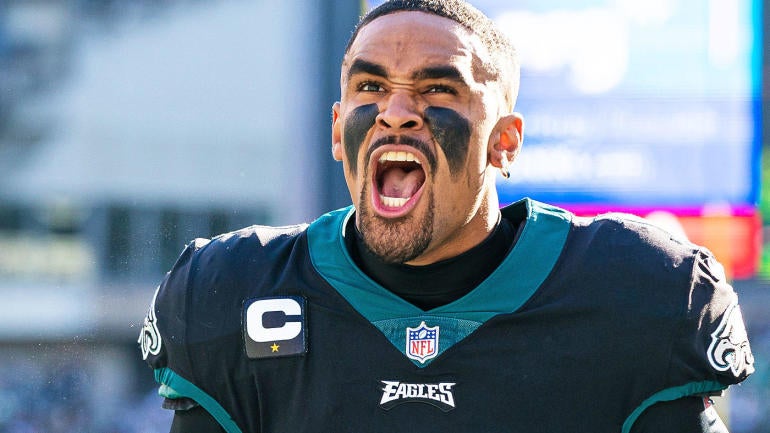
My favorite movie of the past few years is "Everything Everywhere All at Once". I could write 3,000 words on how it plays with the well-worn sci-fi trope of the ever-branching multiverse in some incredibly interesting ways, but my favorite is the idea that, somewhere out there, there has to be a version of every person who made the wrong decision at every step.
Maybe it's because I've had a few Fantasy Football drafts like that. Heck, everyone has, I'm sure. But every draft is sort of like that sci-fi trope -- every pick on its own may not diverge much from what you expect to happen, but when you add it all up, every draft ends up being quite a bit different than every other one. Every pick you make necessarily involves choosing one player over others, and each choice changes which players will be available both for your opponents' next picks as well as your own. The sum of those choices, along with how you manage your team moving forward, will determine how your season ends up.
For this year's CBS Sports Fantasy Football Draft Guide magazine -- which you'll be able to purchase at this link and on newsstands everywhere soon -- I wrote about the players who could make or break your team in this year's drafts, and I have that piece right here for you in today's Fantasy Football Today Newsletter.
Now, of course, no one pick will ever single handedly decide your fortunes in Fantasy Football. You may think, "I have to have Player X" or, "There's no way I'm drafting player Y," but the truth is, you can win or lose with any combination of players. There are teams that lost with Cooper Kupp last season just like there are teams that won after spending the first overall pick on Christian McCaffrey.
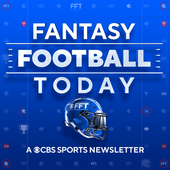
Fantasy Football Today Newsletter
Know What Your Friends Don't
Get tips, advice and news to win your league - all from the FFT podcast team.
Thanks for signing up!
Keep an eye on your inbox.
Sorry!
There was an error processing your subscription.
There are too many variables at play for any one pick to be the deciding factor in whether you win or lose your championship at the end of the season. You can always make up for a bad pick -- and for what it's worth, I wrote about my bust picks this week, in case you're wondering who I think those bad picks might end up being.
Still, there are pivot points in every draft where you'll have to make a decision on a player you know will play an outsized role in how your season turns out. These are, invariably, early-round decisions on players with significant question marks surrounding them, and there may be no better example than the decision you'll have to make on Christian McCaffrey early in the first round.
We've seen McCaffrey put together one of the best seasons in Fantasy Football history in 2019, racking up nearly 100 more points than last year's No. 1 RB, Jonathan Taylor – in one fewer game!
But McCaffrey has played just 10 games over the past two seasons due to his ankle (twice), shoulder, and hamstring. Compare that to Taylor, the near-consensus No. 1 pick, who hasn't missed a game in his NFL career and who missed just two total dating back to his three years in college.
Most people are going to choose Taylor with that first pick, and many will pass on McCaffrey with the second or third pick, too, based on the idea that, while you can't win your league with a first-round pick, you might be able to lose it with the wrong one. I'm not sure I agree with the premise – McCaffrey is my No. 1 running back and overall player – but that's the risk-reward calculation a lot of players are going to have to make early in their drafts.
That's just the first potential pivot point in your draft. There will be plenty of them along the way, and how they work out is going to play a big part in how this season turns out for Fantasy players.
Here are nine more of the most pivotal players in the early rounds, with the case for and case against taking the risk on each one:
Make or break players for 2022
The case for: Jackson's 2019 is still the gold standard for Fantasy scoring by a quarterback among active players – his 32.5 points per game in CBS Sports scoring are the most since Peyton Manning's 2013 season. Jackson remains the best rusher at the position, and as you'll read elsewhere in this magazine, rushing production remains the path to elite upside for quarterbacks in Fantasy. However, he also threw more than ever in 2021, averaging five more attempts per game than during his MVP season while sustaining much of his efficiency – 7.5 yards per attempt in 2021 vs. 7.8 in 2019. If Jackson can recapture the big-play magic he had in 2019, his upside is arguably even higher in a more pass-heavy offense.
The case against: Is this actually a more pass-heavy offense? The Ravens did jump to ninth in pass attempts last season after ranking dead last each of the previous two seasons. But they also lost the top three running backs on their roster prior to the season, with the ghosts of Devonta Freeman, Latavius Murray, and Le'Veon Bell ultimately logging significant snaps for them. With J.K. Dobbins and Gus Edwards healthy to start the season, why wouldn't they just go back to the 2019-20 blueprint? Jackson still has No. 1 QB upside, but the path is a narrower one. Is that worth reaching at a top-five QB price?
The verdict: Jackson is my No. 3 QB and I'm willing to take him as early as the beginning of the fourth round, though you might be able to wait in most leagues. His 64.51 ADP right now makes him one of the best values you'll find.
The case for: Hurts is the best non-Jackson rusher in the NFL, coming off a season with 784 yards and 10 touchdowns in 15 games. He has legitimate 1,000-yard upside as a runner on a team that has embraced that aspect of his game. But it's the addition of A.J. Brown that gives him QB1 upside. Brown is one of the best wide receivers in the game, capable of winning over the top of the defense or, crucially, with the ball in his hands after a short catch. The Eagles are giving Hurts the weapons he needs in Brown and second-year WR DeVonta Smith, and if he makes a leap as a passer while sustaining his elite rushing production, he could challenge for that top QB spot.
The case against: Hurts might just not be that good. The Eagles ended up making a playoff run last season only after they embraced a super-conservative game plan that hindered Hurts' production. He went from averaging 26.4 points per game during the Eagles 2-5 start to just 19.2 while going 6-2 over his final eight games, during which his pass attempts per game dropped from 34.6 to 23.8. Brown will make his job easier, and that trade does potentially indicate a willingness to throw more, but we've already seen the Eagles find success by leaning on Hurts less. If their backs are against the wall, they may just do the same again.
The verdict: Hurts is another risk I'm willing to take, as he's my No. 5 QB. The good news is, you don't need to take him that early, and if you're really worried about the risk, snag someone like Derek Carr or Kirk Cousins late who brings a high floor with him.
The case for: Henry is the outlier of all outliers, and elite Fantasy running back who dominates by sheer brute force. He routinely racks up 30-plus carries in an era where that almost never happens, and he's liable to break off a 70-yard touchdown run at any point, turning a good game into a great one in the blink of an eye. And with A.J. Brown gone, he's even more important for the Titans' chances of continuing to contend.
The case against: Can the Titans keep riding him the way they have? He missed nearly three months due to a broken foot last season, and now he's a 28-year-old who weighs 247 pounds coming off a serious injury. He had no injury track record to speak of at the NFL level before that, but when a significant part of the case in your favor is based on an almost Herculean level of physical dominance, any sign of mortality is going to loom large.
Verdict: Based on early drafts, Henry is still a top-six pick in most leagues, and that's just too rich for my blood coming off that kind of injury -- that's why he's a bust pick for me. He's the first-round injury red flag I'm most worried about avoiding, not McCaffrey.
The case for: Even in a season where the Saints offense was often weirdly passive, if not actively dysfunctional, Kamara finished as the RB6 in points per game. He did that despite catching just 3.6 passes per game, his first season below 5.1. Any regression in the Saints' pass volume is only going to be good for Kamara, who figures to benefit from a rising tide around him. Last season might be the floor.
The case against: Kamara is facing felony charges stemming from an altercation in February and, as of printing, we don't know what kind of punishment he may be facing, both in the eyes of the law and the league. He is set for a hearing Aug. 1, but it's likely this isn't settled by then. It's possible we won't hear anything from the league until after the season, but with this hanging above him, it's not at all clear whether Kamara will even be available this season.
Verdict: Given that the NFL prefers to let the legal process work out before meting out punishment of its own, I think there's a decent chance Kamara isn't punished until next season, but I won't take the risk on him in the first round, at least.
The case for: We only really got one look at Williams as a true lead back, but he was spectacular, rushing for 102 yards and a touchdown along with six catches for 76 yards and another score in Week 13 against the Chiefs. Williams had the look of a true, three-down difference maker as a rookie, and the Broncos offense is poised to take off like a rocket ship with Russell Wilson coming in as QB.
The case against: Of course, Williams only got one chance to be a true lead back last season because Melvin Gordon was around, and he re-signed with the Broncos this offseason. Getting him back wasn't a huge priority, as he didn't sign until late April, but he still figures to be a thorn in the side of Williams' Fantasy appeal. Even if Williams increases his share of the touches in Year 2, Gordon could play a significant enough role to make Williams more like a No. 2 RB. That's not worth a borderline first-round pick.
The verdict: If Williams is going to cost a first-round pick or something close, he's an easy fade for me. Even projecting him for a bigger share of the RB work than last year, he's RB15 for me.
The case for: Samuel had two incredible seasons in one last year. Through Week 9, he was averaging 110 receiving yards per game with five total touchdowns in eight games; then, he averaged 65 receiving yards and 43 rushing yards from that point on, as the 49ers transitioned him to a hybrid role where he lined up in the backfield regularly. Samuel won as both a WR1 and an RB, and Kyle Shanahan is the kind of coach who is going to continue to take advantage of that rare skill set.
The case against: Of course, Samuel is reportedly not super happy with the way the 49ers used him down the stretch and made that frustration known this offseason. It ultimately seems like he's going to be back with San Francisco, but whether he'll have that hybrid role is a different story – Shanahan indicated he would like to continue to use Samuel that way, but if Samuel isn't happy with it, that could change. And it might be tough for Samuel to live up to expectations without a consistent running game role. The 49ers have George Kittle and Brandon Aiyuk to work into the passing game too, and with Trey Lance taking over as the starting QB, the passing game very well may take a step backward in his first season. Either way, pass volume figures to be somewhat limited given Lance's rushing abilities, so if Samuel is used more conventionally, he could end up a pretty big disappointment.
The verdict: I love Samuel's skill set, but I'm scared of the 49ers offense. He's a No. 1 WR for me, but I'd prefer to wait until the third round to take him if I could.
The case for: NFL teams and Fantasy players have been looking for "the next Tyreek Hill" ever since he broke out, but the truth is, Hill is just an outlier. He's arguably the fastest player in the league, with an uncanny ability to get open down the field or break big plays with the ball in his hands. Sure, he's playing without Patrick Mahomes, but he also averaged 82.8 yards per game and finished as WR8 with Alex Smith back in 2017, in just his second season. Hill wasn't a product of Patrick Mahomes by any means, and Miami has every reason to feature him heavily after how much they gave up for him.
The case against: There's room between "was a product of Patrick Mahomes" and "QB doesn't matter," and I'm not sure where Tua Tagovailoa falls on that spectrum at this point. He definitely doesn't have Mahomes' arm, of course, nor his ability to extend plays, and Hill, more than most high-end receivers, relied on big plays for a lot of his value at his best. That hasn't really been a part of Miami's offense with Tagovailoa, and Hill has never really been the kind of target hog receiver who can make up for missing big plays. It just comes down to this: Hill's situation might just be a lot worse than it was in Kansas City.
The verdict: I'm mostly in line with the consensus on Hill's value, so he's a fine second-round value. But I'm not sure he's got that 1,400-yard upside anymore, if you're chasing the highest ceiling players early.
The case for: Pitts didn't turn 21 until after his rookie season started, which makes his 68 catches for 1,026 yards even more impressive than it seems. That he did that with defenses making him the focal point of their coverage just adds to the degree of difficulty. Pitts is a historic talent at tight end coming off a historic rookie season, and this might be your very last chance to get him as something less than the first tight end off the board for the next half-decade or more.
The case against: There were too many games where Pitts just didn't make much of an impact as a rookie; he had fewer than 50 yards in seven games and had more than 10 PPR points just six times. Part of that was just bad touchdown luck, as he scored just once, but he's also dealing with a downgrade at QB from Matt Ryan to Marcus Mariota here, so how much improvement can we really expect? Especially if Drake London isn't ready to strike fear into the heart of opposing defenses just yet.
The verdict: An elite tight end is the biggest edge you can get on your competition, and basically all signs point to Pitts becoming exactly that. He certainly has a lot working against him to get there, but Pitts is worth the bet for me.
The case for: Godwin is a WR1 when healthy. He's Tom Brady's top target and a PPR monster who was on pace for 120 catches before his injury last season. And with Antonio Brown and Rob Gronkowski both out of the picture – at least for now, in Gronk's case – he could be in line for an even bigger role in Tampa's offense.
The case against: It's the injury. Godwin tore his ACL on Dec. 19, 2021 and had surgery in early January, which means Week 1 will be less than nine months removed from the injury and just eight months after from surgery. Seeing as the average return to play for a wide receiver coming off a torn ACL is between 10 and 11 months, it's asking a lot for him to be ready for Week 1, let alone ready to dominate. We'll know more about his timetable come training camp, but it's realistic that you could end up without Godwin until October or even November.
Verdict: Godwin has plenty of upside, sure, but unless we get glowing reports from training camp and he is a full participant, I'm not taking him in the first four or five rounds.

